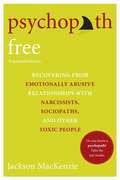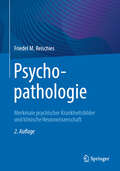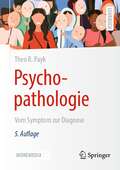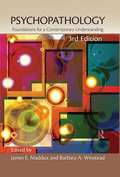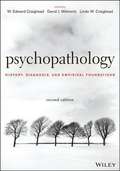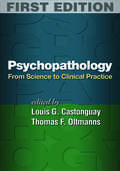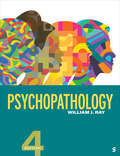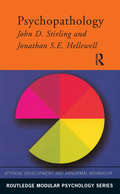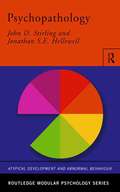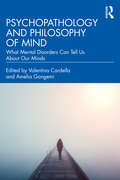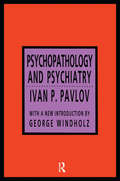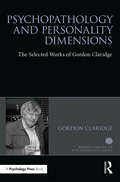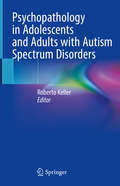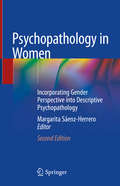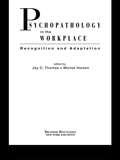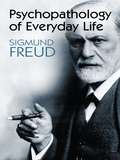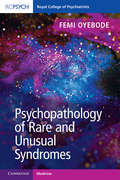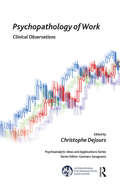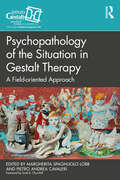- Table View
- List View
Psychopath Free (Expanded Edition): Recovering from Emotionally Abusive Relationships With Narcissists, Sociopaths, and Other Toxic People
by Jackson MacKenzieFrom the author of Whole Again comes a significantly expanded edition of Psychopath Free—containing new chapters, updated content, and real survivor experiences—that will help you recover from emotionally abusive relationships with narcissists, sociopaths, and other toxic people.Have you ever been in a relationship with a psychopath? Chances are, even if you did, you would never know it. Psychopaths are cunning charmers and master manipulators, to the point where you start to accept the most extreme behaviors as normal...Even if it hurts you. All around us, every single day, human beings devoid of empathy are wreaking havoc and destroying lives in the coldest, most heartless ways imaginable. In constant pursuit of money, sex, influence, or simple entertainment, psychopaths will do whatever it takes to gain power over others. They hide behind a veil of normalcy, arranging their friends and partners like pawns in a game of chess. Using false praise and flattery to get what they want, they can lure any unsuspecting target into a relationship. Once hooked, their charming promises spin into mind games and psychological torture. Victims are left devastated and confused, unable to recognize—or even put into words—the nightmare that just took place. Written from the heart, Psychopath Free is the first guide for survivors written by a survivor, offering hope for healing and thriving after psychopathic abuse. Say goodbye to the chaos, self-doubt, and victimization. You are free.
Psychopathia Sexualis: The Classic Study of Deviant Sex
by Richard von Krafft-Ebing Joseph LopiccoloPreceding Freud's Three Contributions to the Theory of Sex by more than twenty years, Richard von Krafft-Ebing's Psychopathia Sexualis pioneered the psychological study of sexual behavior.<P><P> This classic nineteenth-century work on sexual aberration addressed such previously taboo subjects as bestiality, cunnilingus and fellatio, fetishism, incest, masochism, masturbation, nymphomania, and sadism, making it the first serious attempt to catalog and define such "deviations." For almost one hundred years, Psychopathia Sexualis stood as the world's most informative volume on the subject of sexual deviation. Arguably the most important precursor to Freud in the study of human sexuality, Krafft-Ebing introduced ideas and concepts that greatly influenced the works of Alfred Kinsey and Masters and Johnson. In his own time Krafft-Ebing was both praised and damned for this volume. Some psychiatrists denounced the work as an immoral apology for perversion and deviance, while others recognized the immense service the author had done for an unjustly neglected area of study. Although sometimes dated by the beliefs and state of knowledge of the time it was written, Psychopathia Sexualis is essential (and immensely entertaining) as one of the most important documents in humankind's modern effort to understand itself.
Psychopathologie: Merkmale psychischer Krankheitsbilder und klinische Neurowissenschaft
by Friedel M. ReischiesWie erklärt die Neurowissenschaft Bewusstseinsänderungen? Was passiert im Gehirn z.B. bei einem Angstzustand? Viele Menschen leiden irgendwann an Symptomen wie Antriebslosigkeit oder Bedrücktheit. Psychiatrische Krankheitsbilder sind psychopathologische Merkmalskomplexe, die eine genaue Beobachtung und Wertung benötigen. Hier finden Leser die Psychopathologie mit ihren neurowissenschaftlichen Grundlagen umfassend dargestellt. Systematisch und übersichtlich sind alle Symptome beschrieben. Fallbeispiele vertiefen Beobachtung und klinische Erfahrung. Jedem Kapitel folgen Definitionen, klinische Gesichtspunkte und Diagnostik. Neurowissenschaftliche Modelle sind für jede Merkmalsgruppe und spezielle Aspekte veranschaulicht. Das Buch richtet sich an Psychiater und andere Berufsgruppen aus der psychosozialen Versorgung sowie interessierte Studenten. Es hilft Untersuchenden, Patienten eine verständliche und zutreffende Erklärung ihres Symptoms zu bieten. Für die Neuauflage wurde das Werk komplett überarbeitet, aktualisiert sowie um neueste Forschungsergebnisse zu spannenden aktuellen Themen, wie z.B. zu Halluzinationen und Deep Learning ergänzt.
Psychopathologie: Vom Symptom zur Diagnose
by Theo R. PaykPsychopathologie ist die Lehre von den psychischen Störungen auf Symptom- und Syndromebene. Erst das exakte Erkennen und Beschreiben der Krankheitszeichen ermöglicht die korrekte Diagnose. In diesem Lehrbuch wird das hierzu nötige Wissen verständlich und anschaulich vermittelt. Es gliedert die Symptome nach Funktionsbereichen (Pathologie des Bewusstseins, der Wahrnehmung, der Gefühle u.a.), erklärt komplexere Syndrome, die sich auf verschiedenen Ebenen des Erlebens, Verhaltens und Handelns äußern und liefert aktuelle Erkenntnisse, notwendiges Kernwissen sowie historische Bezüge. Alles ist lernfreundlich und praxisnah aufbereitet: neben kurzen Beschreibungen der Untersuchungsmethoden zur Erfassung der Symptome bietet das Buch praktische Zusammenfassungen und anschauliche Abbildungen. "Psychopathologie": Symptome erkennen, Symptome verstehen.
Psychopathologies of the Living: Selected Essays of Pierre Fédida (The International Psychoanalytical Association Psychoanalytic Ideas and Applications Series)
by Ffrench PatrickPsychopathologies of the Living makes the work of the French psychoanalyst Pierre Fédida (1934–2002) available in English for the first time.Patrick ffrench and Nigel Saint present key essays selected from Fédida’s extensive oeuvre. The book directs attention to two salient dimensions of Fédida’s writing: his attention to the pathologies of the body, considered as both a psychic and somatic entity, and his insistence on the relevance of psychoanalytic thought to the sciences of life. The chapters included in this collection detail Fédida’s creative use of aesthetic sources in his psychoanalytic work, his distinctive and creative manipulation and revision of central psychoanalytic concepts and his precise attention to the texts of Freud, Ferenczi and Winnicott, among others. This selection of Fédida’s essays also shows his avoidance of thematisation or explicit theorisation; for Fédida the theory of psychoanalysis must arise out of the specific interplay of language and the ‘space of the session’.Psychopathologies of the Living will be of great interest to psychoanalysts in practice and in training and to academics and scholars of philosophy, aesthetics and literary studies.
Psychopathology
by Barbara A. Winstead James E. MadduxThis is the most up-to-date text about the etiology and treatment of the most important psychological disorders. Intended for first-year graduate students in clinical and counseling psychology, the third edition of Psychopathology continues to focus on research and empirically supported information while also challenging students to think critically. The first part of the book is devoted to the issues, ideas, and concepts in psychopathology. These chapters give students a set of conceptual tools that will help them read more thoroughly and critically the second half of the book, which focuses on specific disorders. Each chapter in this section provides a definition, description, and brief history of the disorder it discusses, and outlines theory and research on etiology and empirically supported treatments. The length, organization, content, and level and style of writing are consistently tailored to the audience, and the disorders discussed are the ones most frequently encountered by students in their training and subsequent clinical careers. A new section addresses child and adolescent disorders, while updated sections include dimensional approaches, the biological bases of psychopathology, learning theories, developmental psychopathology, dissociative disorders, mental health and aging, and mood disorders. This valuable teaching tool is not only appropriate for students, but also professionals, who will continue to refer to it as a reference.
Psychopathology
by David J. Miklowitz W. Edward Craighead Linda W. CraigheadFully revised to incorporate DSM-5 criteria and informed by the most current research in its discussions of diagnosis and treatmentNow in a second edition, Psychopathology: History, Diagnosis, and Empirical Foundations thoroughly explores psychopathology with contributions from leading scholars in psycho-pathology. The Second Edition offers an overview of various topics in the context of major changes included in the DSM-5 .With new chapters on contextual factors affecting diagnoses and non-alcohol substance abuse, Psychopathology, Second Edition covers the history, theory, and assessment of anxiety disorders, posttraumatic stress disorder, mood disorders, schizophrenia, the psychotic spectrum disorders, eating disorders, borderline personality disorder, alcohol use disorders, psychopathy, sexual dysfunction, and sleep disorders. In addition, each chapter of the Second Edition contains:A description of the disorder, including brief history, case example, and epidemiological findingsEmpirical foundations of each disorder, including findings regarding neurobiological, behavioral, cognitive, and emotional factorsAssessment of each disorder, including interviews, self-reports, neurobiological assessment, and clinical rating scalesBrief description and evaluation of the current interventions for each disorderSummary and future directionsPractical and thorough, this text is an essential reference for all mental health professionals and a solid introduction for students in psychopathology courses.
Psychopathology
by Thomas F. Oltmanns Louis G. CastonguayThis authoritative text gives students and practicing psychotherapists a rich understanding of the connections between psychopathology research and clinical practice. Chapters thoroughly describe the etiology, symptoms and clinical features, course, epidemiology, and associated comorbidities of prevalent psychological disorders. Changes in diagnostic criteria in DSM-5 are addressed, where applicable. What sets this tightly edited volume apart are insightful discussions of how current empirical findings can inform assessment, case formulation, the therapeutic relationship, and intervention strategies (regardless of theoretical orientation). Each chapter is written collaboratively by leading psychopathology and psychotherapy researchers.
Psychopathology
by William J. RayIn Psychopathology, Fourth Edition, best-selling author William J. Ray brings together current perspectives concerning the manner in which the human mind, behavior, and experience can be understood. In addition to the traditional psychological literature, this book draws from work in the cognitive and affective neurosciences, epidemiology, ethology, and genetics. Ray focuses on unifying and integrating the biopsychosocial understandings of human behavior within a broader consideration of human culture and language as it applies to psychopathology. This title is accompanied by a complete teaching and learning package. Contact your Sage representative to request a demo. Learning Platform / Courseware Sage Vantage is an intuitive learning platform that integrates quality Sage textbook content with assignable multimedia activities and auto-graded assessments to drive student engagement and ensure accountability. Unparalleled in its ease of use and built for dynamic teaching and learning, Vantage offers customizable LMS integration and best-in-class support. It′s a learning platform you, and your students, will actually love. Learn more. Assignable Video with Assessment Assignable video (available in Sage Vantage) is tied to learning objectives and curated exclusively for this text to bring concepts to life. Watch a guided tour to learn more. LMS Cartridge: Import this title’s instructor resources into your school’s learning management system (LMS) and save time. Don′t use an LMS? You can still access all of the same online resources for this title via the password-protected Instructor Resource Site. Learn more.
Psychopathology
by William J. RayIn Psychopathology, Fourth Edition, best-selling author William J. Ray brings together current perspectives concerning the manner in which the human mind, behavior, and experience can be understood. In addition to the traditional psychological literature, this book draws from work in the cognitive and affective neurosciences, epidemiology, ethology, and genetics. Ray focuses on unifying and integrating the biopsychosocial understandings of human behavior within a broader consideration of human culture and language as it applies to psychopathology. This title is accompanied by a complete teaching and learning package. Contact your Sage representative to request a demo. Learning Platform / Courseware Sage Vantage is an intuitive learning platform that integrates quality Sage textbook content with assignable multimedia activities and auto-graded assessments to drive student engagement and ensure accountability. Unparalleled in its ease of use and built for dynamic teaching and learning, Vantage offers customizable LMS integration and best-in-class support. It′s a learning platform you, and your students, will actually love. Learn more. Assignable Video with Assessment Assignable video (available in Sage Vantage) is tied to learning objectives and curated exclusively for this text to bring concepts to life. Watch a guided tour to learn more. LMS Cartridge: Import this title’s instructor resources into your school’s learning management system (LMS) and save time. Don′t use an LMS? You can still access all of the same online resources for this title via the password-protected Instructor Resource Site. Learn more.
Psychopathology (Routledge Modular Psychology)
by John D. Stirling Jonathan S.E. HellewellPsychopathology is a psychologically based account of the major mental illnesses, including schizophrenia, personality disorders, anxiety and mood disorders as well as eating disorders.
Psychopathology (Routledge Modular Psychology)
by John Stirling Jonathan HellewellPsychopathology is a psychologically based account of the major mental illnesses, including schizophrenia, personality disorders, anxiety and mood disorders as well as eating disorders.
Psychopathology and Philosophy of Mind: What Mental Disorders Can Tell Us About Our Minds
by Valentina Cardella; Amelia GangemiThis book explores how the human mind works through the lens of psychological disorders, challenging many existing theoretical constructs, especially in the fields of psychology, psychiatry and philosophy of mind. Drawing on the expertise of leading academics, the book discusses how psychopathology can be used to inform our understanding of the human mind. The book argues that studying mental disorders can deepen the understanding of psychological mechanisms such as reasoning, emotions, and beliefs alongside fundamental philosophical questions, including the nature of the self, the universal aspects of morality, and the role of rationality and normativity in human nature. By crossing different domains, this book offers a fresh perspective on the human mind based on the dialogue between philosophy, cognitive science and clinical psychology. Mental disorders discussed include schizophrenia, anxiety disorders, major depression, obsessive-compulsive disorder, post-traumatic stress disorder and paranoia. This book caters to the increasing interest in interdisciplinary approach to solving some of the problems in psychopathology. Since this book treats psychological engagement with empirically informed philosophy of mind, this book is essential reading for students and researchers of cognitive psychology, clinical psychology, and philosophy, as well as being of interest to clinicians and psychiatrists.
Psychopathology and Psychiatry
by Ivan P. PavlovPavlov’s fundamental theory of higher nervous activity concerns the adaptation to changing external environments of organisms such as dogs, apes, and humans. In the 1920s, Pavlov and his disciples used laboratory experimentation to study the etiology and therapy of neuroses In human beings and other species. Later, In the 1930s, Pavlov devoted much time and effort to the systematic study of psychopathology In clinical settings. Psychopathology and Psychiatry is Pavlov’s little-known series of descriptions of these experiments and findings. Pavlov used two fundamental approaches In the study of neuroses and psychoses: the conditioned salivary reflex method, with dogs as subjects; and the observation of neurotic and psychotic behavior In humans. Pavlov was primarily Interested In how the cortex worked to facilitate the orgaftilsm's adaptation to the external environment. The conditioned reflex findings were explained In terms of hypothetical physiological processes. Pavlov was certain that dogs’ Inability to adapt flexibly was the result of conflicts and traumatic experiences. Soon thereafter, he linked these discoveries to actual human cases of neuroses and psychoses. These are covered In this volume. In a new introduction to this classic text, George Windholz traces Pavlov’s scholarly and scientific life, highlighting his various studies and results under stressful political and pedagogical conditions. Psychopathology and Psychiatry continues to be a highly significant work of scientific study. Psychologists, psychiatrists, and behavioral researchers of all professional persuasions will find this work to be essential reading.
Psychopathology and Psychotherapy: DSM-5 Diagnosis, Case Conceptualization, and Treatment, 3rd Edition
by Jon Carlson Len Sperry Jill Duba Sauerheber Jon SperryPsychopathology & Psychotherapy: DSM-5 Diagnosis, Case Conceptualization, and Treatment, Third Edition differs from other psychopathology and abnormal psychology books. While other books focus on describing diagnostic conditions, this book focus on the critical link between psychopathology and psychotherapy. More specifically, it links diagnostic evaluation, case conceptualization, and treatment selection to psychotherapy practice. Research affirms that knowledge and awareness of these links is essential in planning and providing highly effective psychotherapy.<P><P> This third edition incorporates detailed case conceptualizations and treatment considerations for the DSM-5 diagnoses most commonly seen in everyday clinical practice. Extensive case studies illustrate the diagnostic, case conceptualization, and treatment process in a way that makes it come alive. Written by practicing clinicians with expertise in specific disorders, this book will be an invaluable resource to both novice and experienced clinicians.
Psychopathology and Psychotherapy: DSM-5-TR Diagnosis, Case Conceptualization, and Treatment
by Len Sperry, Jon Sperry, and Marina BluvshteinPsychopathology and Psychotherapy, Fourth Edition, targets the most common diagnostic conditions seen in everyday counseling and psychotherapy practice and integrates DSM-5-TR criteria with the Adlerian view of psychopathology and psychotherapy. It highlights cases that Adler himself treated or consulted on.This reader-friendly guide provides essential, clinically valuable information for understanding and treating individuals living with each disorder. Engaging case examples include DSM diagnoses, Adlerian case conceptualizations, treatment interventions, therapeutic challenges, and clinical outcomes. This blending of psychopathology and effective psychotherapy is exactly what trainees and practicing clinicians need to effect therapeutic change in clients.Written by practicing clinicians with expertise in specific disorders, this book will be an invaluable resource to both novice and experienced clinicians, as well as students.
Psychopathology and personality dimensions: The Selected works of Gordon Claridge (World Library of Psychologists)
by Gordon ClaridgeIn the World Library of Psychologists series, international experts present career-long collections of what they judge to be their finest pieces – extracts from books, key articles, salient research findings, and their major practical theoretical contributions. In this fascinating collection, Professor Gordon Claridge charts the development of a model of mental health that blurs the line between madness and sanity, conditions such as schizophrenia and other forms of psychosis seen as dimensions of ‘normal’ personality and temperament rather than separate abnormalities. Working with, and influenced by, the late Hans Eysenck, Claridge is celebrated for evolving research on personality and psychological disorders into a revised view of the spectrum of psychotic traits. The concept of schizotypy, re-evaluated by Claridge, sees mental illness not as a pathology suffered by a few, but as the end of a continuum experienced by us all. Psychopathology and Personality Dimensions brings together some of the author’s most influential publications on the topics of schizotypy and psychoticism, personality disorders, and the use of drug techniques to investigate normal and abnormal individual differences. Interspersed throughout with specially-written retrospectives by Professor Claridge, looking back at his work and contextualising where it sits in the wider literature, the collection illustrates a radical and influential model of mental illness that continues to resonate today. This book is an essential resource for all those engaged or interested in the field of personality and psychological disorders.
Psychopathology at School: Theorizing mental disorders in education (Theorizing Education)
by Julie Allan Valerie HarwoodPsychopathology at School provides a timely response to concerns about the rising numbers of children whose behaviour is recognised and understood as a medicalised condition, rather than simply as poor behaviour caused by other factors. It is the first scholarly analysis of psychopathology which draws on the philosophers Foucault, Deleuze, Guattari and Arendt to examine the processes whereby children’s behaviour is pathologised. The heightened attention to mental disorders is contrasted with education practices in the early and mid-to-late twentieth century, and the emergence of a new conceptualization of childhood is explored. Taking education as a central component to the contemporary experience of growing up, the book charts the ways in which mental disorders have become commonplace in childhood and youth, from birth through to college and university, but also offers examples of where professionals have refused to pathologise children’s behaviour. The book examines the extent of the influence of psychopathology on the lives of children and young people, as well as the practices that infiltrate education and the possibilities for alternative educational responses that negate the diagnosis of mental disorder. Psychopathology at School is a must read for anyone concerned about the growing influence of psychopathology in education and will be of particular interest to educated readers and to scholars, students and professionals in education, psychiatry, psychology, child studies, youth studies, nursing, social work and sociology.
Psychopathology in Adolescents and Adults with Autism Spectrum Disorders
by Roberto KellerThis book provides a comprehensive overview of the diagnosis, management and treatment of the psychiatric comorbidities encountered in adolescents and adults with Autism Spectrum Disorder (ASD). After discussing key issues in diagnosing ASD in adolescents and adults, the opening part of the book examines the genetics, neuroimaging and neuropsychology of ASD. Several chapters are then devoted to all of the psychiatric comorbidities such as psychosis, obsessive-compulsive disorder, depression, bipolar disorder, anxiety disorders, eating disorders etc. For each disorder, the clinical symptoms, biological basis, diagnostic criteria and treatment options are described in detail. In addition, a special chapter is devoted to people with intellectual disabilities. Thanks to its clear approach, Psychopathology in Adolescents and Adults with Autism Spectrum Disorders will be an invaluable resource for psychiatrists, psychologists and neuropsychiatrists, as well as allied mental health professionals, caring for these patients.
Psychopathology in Women: Incorporating Gender Perspective into Descriptive Psychopathology
by Margarita Sáenz-HerreroThis book examines sex and gender differences in the causes and expression of medical conditions, including mental health disorders. Sex differences are variations attributable to individual reproductive organs and the XX or XY chromosomal complement. Gender differences are variations that result from biological sex as well as individual self-representation which include psychological, behavioural, and social consequences of an individual’s perceived gender. Gender is still a neglected field in psychopathology, and gender differences is often incorrectly used as a synonym of sex differences. A reconsideration of the definition of gender, as the term that subsumes masculinity and femininity, could shed some light on this misperception and could have an effect in the study of health and disease. This second edition of Psychopathology clarifies the anthropological, cultural and social aspects of gender and their impact on mental health disorders. It focuses on gender perspective as a paradigm not only in psychopathology but also in mental health disorders. As such it promotes open mindedness in the definition and perception of symptoms, as well as assumptions about those symptoms, and raises awareness of mental health.
Psychopathology in the Workplace: Recognition and Adaptation
by Michel Hersen Jay C. ThomasThis text provides students and professionals with the knowledge they need to treat work-related psychopathology and contribute to this new and growing aspect of clinical practice.
Psychopathology of Everyday Life
by Sigmund FreudAccording to Freud, our daily lives teem with unwitting expressions of the wishes and ideas we try to keep hidden. These suppressed notions elude our conscious control and take the form of slips of the tongue, jokes, and seemingly accidental gestures. In this classic of psychology, Freud explores the phenomenon of parapraxes: slips of the tongue commonly known as Freudian slips, acts of forgetfulness, misinterpretations, and "accidents." These simple and apparently trivial events, he explains, can possess deeper meanings with subconscious motivations — meanings that can be revealed by analysis and can ultimately offer a clearer perception of the self.Psychopathology of Everyday Life remains one of Freud’s most widely read books, full of anecdotal accounts (many of them quite amusing) and free from jargon and technical terminology. Freud draws from his personal experience to illustrate his points, citing many incidents of his own deliberate forgetting or "inexplicable" mistakes, and his conviction that these actions cannot be called truly accidental or uncaused is the primary lesson of this book. As the title suggests, this work has helped unravel the mysteries of the ordinary events of our daily lives, offering us a deeper understanding of ourselves and our motivations.
Psychopathology of Rare and Unusual Syndromes
by Femi OyebodeRare and unusual psychiatric syndromes have fascinated people for centuries due to their complexity and undefined nature. Appreciating their clinical importance and relevance to understanding other conditions and experiences, this book provides an authoritative account of the rarest and most unusual psychiatric syndromes. The author, a leading authority on clinical psychopathology, delves into the history of the description of such syndromes, illustrates conditions with clinical case examples, and discusses the causes as well as the underlying explanatory mechanisms. The syndromes described draw attention to the way in which abnormal subjective experiences reflect the intersection of biomedical science, social anthropology, social sciences, evolutionary biology and the humanities. The book covers abnormalities of belief, abnormalities of perception, unusual experiences of the body and self, rare and bizarre impairments of memory, and behavioural disturbance. This is a valuable resource for psychiatrists, as well as researchers interested in the relationship between psychiatry and other disciplines.
Psychopathology of Work: Clinical Observations (The International Psychoanalytical Association Psychoanalytic Ideas and Applications Series)
by Christophe DejoursThis book examines the processes at issue in the onset of psychiatric disorders linked to stress in the workplace. Six clinical observations are presented: an acute psychosomatic decompensation (status asthmaticus); a delirious episode; a dementia-like confusional state; a sexuality disorder; two successive decompensations (one in a victim of workplace harassment and one in her aggressor); and a suicide. Each is explored in detail, from aetiology to treatment, bringing into sharp relief the differences between conventional analysis and the interpretation of material in light of the reference to work. These studies have been written by psychoanalysts and may be used as a training resource for practitioners and students alike. For any professional or researcher involved in the world of work, these observations will offer a deeper understanding of this particular work-related mental pathology which characterises the development of our contemporary society.
Psychopathology of the Situation in Gestalt Therapy: A Field-oriented Approach (Gestalt Therapy Book Series)
by Margherita Spagnuolo Lobb Pietro Andrea CavaleriThis collection explores the impacts and new ways of treatment of difficult clinical situations, in the uncertainty of a world in crisis, through a phenomenological and aesthetic field-oriented lens. Each author offers a Gestalt-centered perspective on clinical issues – a situational window, which includes the therapist and avails itself of tools configured to modify the entire experiential field. Through clinical case studies and theoretical reflections, the book examines the experience of children, difficult childhood situations (such as separations, abuse, neurodevelopmental disorders, adolescent social closure), the experience of dependency, couples and family therapy, the condition of the elderly and the end of life, interventions for degenerative diseases, and the trauma of loss and mourning, all of which are considered according to two cardinal points: first, the description of the relational ground experiences of patients, and second, the aesthetic relational knowing, a field perspective which allows the presence of the therapist to be modulated. Psychopathology of the Situation in Gestalt Therapy: A Field-oriented Approach is essential reading for Gestalt therapists as well as all clinicians with an interest in phenomenological and aesthetic understanding of the complexity of clinical situations.
